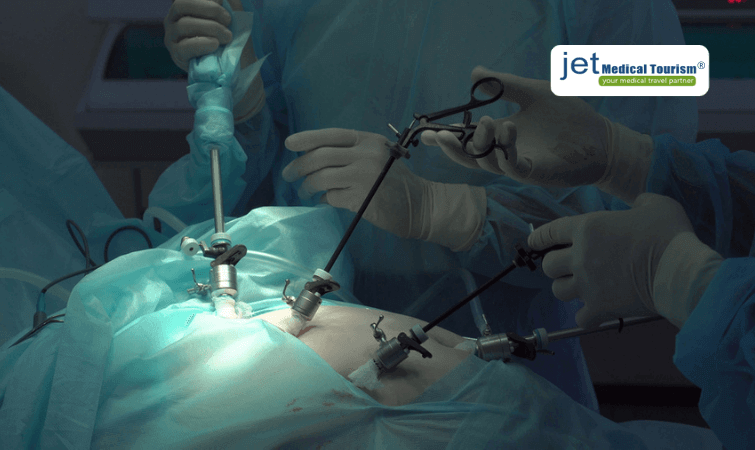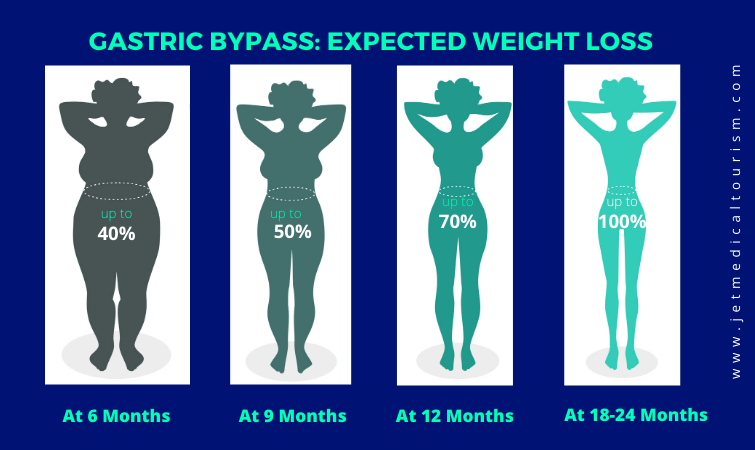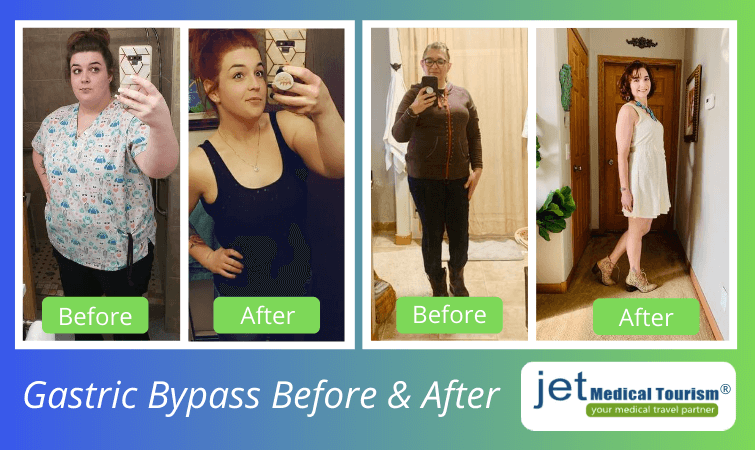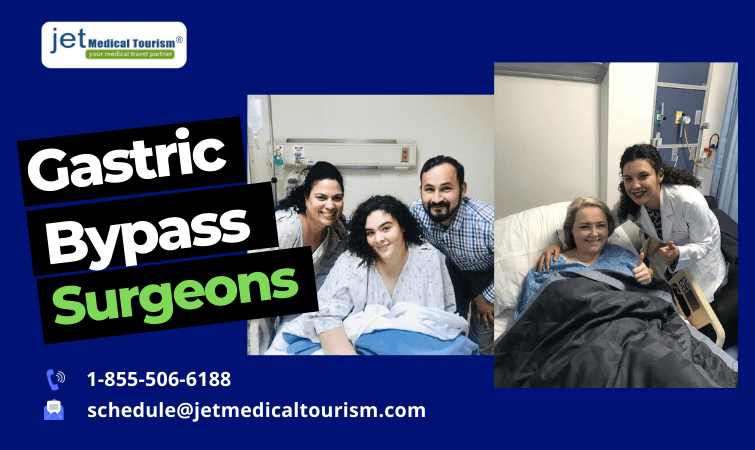What is Gastric Bypass Surgery?
“What is gastric bypass surgery?” is a question that millions of people around the world who are struggling with obesity wish to ask. Gastric bypass is a tried and tested form of weight loss surgery that has been around for over half a century. The surgery is now mostly performed using the advanced laparoscopic technique, which is safer and less invasive. Each year thousands of women and men undergo gastric bypass surgery to gain permanent freedom from obesity.
However, it is important to remember that gastric bypass will only facilitate your weight loss by reducing your stomach’s eating capacity and curbing your hunger. The success of the procedure will depend on your lifelong commitment to a balanced diet and active lifestyle following the surgery. What you discuss with your surgeon about, “What is gastric bypass surgery,” be prepared to clear all doubts and concerns you may have before going ahead with the procedure.
Do you wish to understand what is gastric bypass surgery and how it can help you get rid of obesity? Talk to our dedicated bariatric surgeons at Jet Medical Tourism® today!
What is gastric bypass weight loss surgery?
Gastric bypass surgery is a proven bariatric procedure to help you eliminate obesity and any underlying medical conditions. This life-changing surgery involves a reduction of stomach size and rerouting of the small intestine to aid weight loss. If you are suffering from obesity, you should ask a qualified surgeon about what is gastric bypass surgery. They will educate you about the procedure, evaluate your candidacy, and help you make an informed decision.
How does it Work?
Gastric bypass surgery promotes weight loss by:
- Limiting the amount of food you can store in your stomach
- Reducing the absorption of calories in your body
- Adjusting your gut hormones to reduce your hunger
- Reversing your obesity-induced metabolic syndrome
What are the Benefits?
Gastric bypass surgery offers the following benefits:
- Rapid weight loss of up to 80% of excess weight in the first year
- Excellent long-term success rate and sustainable results
- Successful resolution or improvement of co-morbidities
- Cosmetic enhancement and boost to self-image and confidence
What is Roux-en-Y Gastric Bypass?
When you ask a bariatric surgeon about “What is gastric bypass surgery,” you should also seek to understand what is Roux-en Y gastric bypass. This technique is now accepted as the “gold standard” in bariatric surgery. Here are the steps involved in a Roux-en-Y gastric bypass surgery:
- The surgeon will bifurcate the upper portion of your stomach from the remaining stomach to create a small pouch.
- They will divide the small intestine, and connect the lower end of the intestine directly to the new created pouch.
- The surgeon will connect the upper part of the bifurcated intestine to the lower part to create a passage for digestive juices and enzymes.
Gastric bypass surgery requirements
For your own safety, it is important to have a trusted bariatric surgeon assess your candidacy for gastric bypass. The international medical community has established standard guidelines that can qualify you for this procedure. Here are the latest gastric bypass surgery requirements that you should fulfill:
- Your BMI (body mass index) is at least 40 or above
- Your BMI is between 35 and 40, and you suffer from one or more obesity-related medical condition
- Your BMI is between 30 and 35, but you have severe co-morbidities and your surgeon recommends you for gastric bypass surgery
- You have tried to follow diet and exercise plans to lose weight, but failed to achieve the desired results
Are You Ready for Weight Loss Surgery?
In some cases, it is possible that you meet all the gastric bypass surgery requirements, but your surgeon wants you to go through additional screening to determine your candidacy. Your weight loss surgeon, along with a physician, psychologist, and dietitian may assess whether you are fit to undergo a gastric bypass.
The surgeon’s goal will be determine that your anesthesia and surgery risks should not outweigh the potential health benefits. They will also want to ensure that you are emotionally ready and prepared to go through the surgery and the post-op diet and fitness plan.
How long does gastric bypass surgery take

Gastric bypass surgery can take about 90 to 120 minutes in the operating room, but the duration may vary in each case. When you ask your bariatric surgeon about, “What is gastric bypass surgery?” they will explain to you all about the procedure, including the estimated time you may have to spend in the surgery room.
Outpatient Procedure
Nowadays, many patients are able to return to their home or hotel room within a few hours after their gastric bypass surgery. You will spend a few hours after the procedure in a dedicated recovery area at the hospital. Once your surgeon decides that you have sufficient recovered from anesthesia and have no apparent complications, they may discharge you the same day from the hospital.
Overnight Hospital Stay
Depending on your health condition, sometimes your gastric bypass may last longer in the surgery room. At the same, your surgeon may want to keep you under medical observation for at least one to two days. In this case, your surgery plan may include a hospital stay for one or two nights. You will receive top medical attention and nursing care to ensure your post-operative healing progresses well.
Gastric bypass surgery diet
Gastric bypass surgery diet will play a vital role in your weight loss journey. Your bariatric surgeon will provide you a detailed diet plan that will scientifically cover your daily nutrition and calories. Considering the fact that gastric bypass is a malabsorptive surgery, nutrient deficiency is a lifelong risk. Your gastric bypass surgery diet will not only help you achieve long-term weight loss, but also preserve your health and nutrition.
General Gastric Bypass Dietary Guidelines
- Eat your meals in small portions
- Eat slowly and chew your food thoroughly
- Avoid fatty, sugary and processed foods in your diet
- Maintain a daily record of your protein and calorie intake
- Minimize the intake of pasta, bread, rice and hard meats
- Choose foods rich in lean proteins and ensure daily intake of 75g
- Avoid carbonated and caffeinated drinks and do not use a straw
- Your daily calorie intake should ideally be about 1,000 calories
- Drink plenty of water every day to stay well-hydrated
- Avoid or minimize the use of alcohol and smoking
Nutrition Supplements after Gastric Bypass
Nutrition supplements are a key component along with a gastric bypass surgery diet. Supplements in powder form are ideal, but if you taking them in pill form, it is best to crush them into small pieces. Considering your post-surgery anatomy, whole pills may not be easy to absorb.
- Multivitamins: Take chewable high-potency mineral and multivitamin supplements as prescribed by your surgeon or nutritionist. The supplement should include iron, zinc, copper, selenium, and folic acid.
- Calcium Supplement: Your surgeon may recommend about 1,500 mg of calcium dosage per day for you in the form of calcium citrate. This will prevent calcium deficiency and loss of bone density.
- Vitamin D Supplement: You may get periodically tested for the vitamin D levels in your body. In case of deficiency, you may have to take about 1,000 IUs of vitamin D along with your calcium supplements.
- Vitamin B12 Supplement: Your surgeon may prescribe this vitamin in a dosage of 500 mcg per day. You may use it in sublingual form, which can be placed under the tongue for quick dissolving.
Gastric bypass diet before surgery
Gastric bypass diet before surgery is critically important. The goal is to reduce the excess fat deposits around your liver, which will allow your bariatric surgeon to navigate your digestive anatomy during the procedure. Failure to follow your gastric bypass pre-op diet could result in a delay of your scheduled surgery.
The standard gastric bypass diet before surgery includes a high protein content and minimum carbohydrates and fats. You may have to limit your daily calorie intake to about 800 to 1,000 calories in this phase. The final leg of your pre-op gastric bypass diet may include 100% liquid diet for about two days.
Long term diet after gastric bypass surgery
Long-term diet after gastric bypass surgery will begin somewhere around the 4th or 5th month post-surgery. The long-term plan will include a daily calorie consumption of about 1,000 calories. You may divide your daily meals into three small meals and one or two snacks. Protein shakes may be discontinued or reduced, while the focus on natural lean protein foods will continue.
You can gradually expand your choice of low sugar, low fat foods, which you can tolerate well. Keep avoiding high fiber veggies and fruits, red meats, and breads if you feel discomfort after eating them. Drink at least two liters of water per day, unless your medical condition contraindicates it. Keep reviewing your long-term diet after gastric bypass surgery with your nutritionist from time to time.
How much does gastric bypass surgery cost
Gastric bypass surgery cost is about $5,000 to $6,000 on average in Mexico. However, the same procedure in the US or Canada may cost you upwards of $20,000. During your initial consultation, you should feel free to ask your weight loss surgeon about how much does gastric bypass surgery cost. Request them to inform you the full cost, including the costs of anesthesia, operating room charges, and pre- and post-op expenses.
Affordable Cost in Mexico
The cost of gastric bypass surgery is significantly lower in Mexico when compared to the US or Canada. The primary reason is that the general cost of living is much cheaper in Mexico. Even the most qualified bariatric surgeons in Mexico will charge a far lower fee than their counterparts in the US or Canada. Similarly, the hospital overheads are much lower in Mexico. All this ultimately benefits the patient in terms of a low cost gastric bypass.
Costs can Vary between Patients
When you ask your surgeon about how much does gastric bypass surgery cost they will determine the cost estimate that is unique to your case. Some patients may have a more complicated procedure that requires a bariatric surgeon and other physicians. A few patients may need hospital stay for two or three nights. In some cases, multiple procedures may be necessary. Based on these issues, the gastric bypass cost could vary between patients.
Gastric bypass surgery cost without insurance
Gastric bypass surgery cost without insurance is about $25,000 on average in the US or Canada. Looking at this exorbitant cost, thousands of patients are now choosing Mexico as their medical tourist destination for this surgery. In Mexico, as an uninsured or under-insured patient, you can easily afford this surgery at any of the leading hospitals or bariatric centers. Your procedure will be performed on priority by top bariatric surgeons in Mexico.
Gastric bypass surgery cost without insurance is as low as $5,000 to $6,000 on average in Mexico. In the US or Canada, even if you have insurance, you will be required to pay certain costs out of pocket (such as deductibles and co-pays). The waiting times can be long and it is not easy to get the insurance company’s approval for coverage. All these limitations are avoided when you get this surgery done in Mexico.
Expected weight loss after gastric bypass surgery
One of the first concerns of patients is what will be their expected weight loss after gastric bypass surgery. A dedicated bariatric surgeon will provide you the correct estimate based on your BMI, health condition, and your personal goals and commitment. It’s vital to follow the surgeon’s post-operative guidelines and remain realistic so that you do not set yourself up for any disappointment.

- At 6 Months: Gastric bypass surgery will help you achieve rapid weight loss in the first few months itself. At six months, you could have lost up to 40 percent of your excess weight. In other words, if your pre-surgery excess weight was 100 pounds, you can shed off about 40 pounds at six months.
- At 9 Months: If you did not lose adequate weight in the first six months, your surgeon and nutritionist will help you reach your goal of up to 50 percent weight loss by the end of nine months. The pre-condition is that you should continue to diligently follow your gastric bypass surgery diet.
- At 12 Months: From the time when you first asked, “What is gastric bypass surgery,” you would have come a long way by the end of first year. Many patients are able to lose up to 70 percent of their excess body weight by this time. Review your health and nutrition levels along with your weight at this stage.
- At 18 to 24 Months: Depending on your commitment and focus on your diet and fitness plan, you can expect to lose up to 100 percent of your excess weight and become obesity-free at this stage. Losing up to 100 pounds of excess weight is certainly possible for many patients at about 1.5 to 2 years post-surgery.
Gastric bypass recovery time
Gastric bypass surgery recovery time is about one to two weeks on average. During the first week after the surgery, you should take plenty of rest at your home or hotel room. Many patients are able to return to their regular routine or go back to work by the second week. However, you must continue to avoid strenuous physical activities, lifting of heavy objects, and bending for about three to four weeks.
Fitness Exercises after Gastric Bypass
At about four weeks, most patients may feel that their gastric bypass recovery time is completed and they can do any kind of activities. However, vigorous exercises at the gym should be avoided for at least six to eight weeks after your gastric bypass surgery. Go by your surgeon’s advice and allow your healing to be completed well before you move on to all types of sports and fitness exercises.
Follow All Necessary Precautions
To minimize your gastric bypass recovery time, you should observe all the precautions your surgeon will recommend. Do not smoke for at least a few weeks after surgery, and continue to avoid blood thinning medications and NSAIDs in accordance with the surgeon’s advice. Follow your prescribed diet, take your medications and supplements on time, and if possible, join a support group to ensure a healthy and strong recovery.
Gastric bypass success rate
When you ask your weight loss surgeon about, “What is gastric bypass surgery,” you should also discuss with them about the success rates of this procedure. This will help you make up your mind and give you the confidence that the surgery is safe for you. A dedicated surgeon will provide you accurate and transparent information about gastric bypass success rate.
- Weight Loss Success: An NIH research study shows that most patients will lose 65% of their excess weight on average after a Roux-en-Y gastric bypass. More than 85% of the patients will lose and maintain at least 50% of their initial weight loss.
- Low Complication Rate: Serious complication rate in the early post-surgery phase after a gastric bypass is as low as 5%. The same NIH study also shows that mortality rate is only about 0.1%. Long-term nutrition deficiency issues after gastric bypass are relatively rare.
- Low Failure Rate: The research study shows that revision gastric bypass for complications or weight loss failure is an infrequent occurrence. Likelihood of weight loss success and resolution of co-morbidities is high. Long-term weight loss failure is as low as 10 to 15% only.
RELATED READ: Gastric bypass success stories: Carole
Gastric bypass surgery before and after pictures
Gastric bypass surgery before and after pictures can serve as an effective visual aid to help you understand the potential benefits of the procedure. As your surgeon explains to you about what is gastric bypass surgery, they may present before you these before and after images to help you to form your own opinion and make an independent decision.
You should review as many gastric bypass surgery ‘before and after’ pictures as possible at your surgeon’s office. This will give you clear insights into what this procedure can or cannot do for you. You may even request your surgeon to share a gastric bypass surgery video with you for a clearer understanding of this procedure and its expected results.
Risks of gastric bypass surgery
Although the gastric bypass success rate is very high, some degree of risk is unavoidable. Certain risks are general in nature, while some are specific to gastric bypass surgery. Your surgeon will require you to sign consent forms before you go ahead with the procedure. Therefore, it is vital that you understand the gastric bypass surgery risks and make an informed choice.
General Risks of Gastric Bypass
- Bacterial infection
- Excessive bleeding
- Poor anesthesia reaction
- Blood clotting
- Breathing difficulties or lung problems
- Perforations or leakage in the intestines
- Nerve injury or internal organ injury
Specific Risks in the Long Run
- Dumping syndrome
- Nausea, vomiting, diarrhea
- Bowel obstruction
- Hypoglycemia (low blood sugar)
- Ulcers, hernias, gallstones
- Stomach perforation
- Malnutrition
How to Minimize Your Risks
- Choose an experienced gastric bypass surgeon
- Follow the correct gastric bypass diet
- Abide by the surgeon’s pre-op and recovery instructions
- Protect the incision sites from contamination and injury
- Take your medications and supplements as directed
- Maintain your follow-up appointments with the surgeon
MUST READ: Gastric bypass pros and cons
Gastric bypass surgery complications
Gastric bypass surgery complications are relatively uncommon, but you should be aware of them before you commit yourself to the procedure. In general, the benefits of gastric bypass will significantly outweigh the risk of complications. Make sure you work with a highly skilled and experienced bariatric surgeon in order to achieve a safe and predictable outcome. Here are some of the gastric bypass surgery complications to watch out for.
- Stomal Stenosis: This complication may occur after a Roux-en-Y gastric bypass if the newly created opening between the intestine and stomach is narrow and tight. The patient may experience nausea and vomiting after they eat or drink anything.
- Dumping Syndrome: This condition typically occurs when the patient eats excessive food without proper chewing or chooses fatty, sugary, or hard foods. If the solid food gets ‘dumped’ into the stomach directly, it can cause abdominal pain, nausea, and bloating.
- Peritonitis: This is a serious gastric bypass surgery complication, which occurs when a stomach leak develops. It will cause inflammation of the membrane lining the inside of the abdomen (called peritoneum). Fever, pain, and pelvic pressure may occur.
- Nutrition Deficiency: Gastric bypass is a malabsorptive procedure, which can cause poor absorption of vital nutrients. If you do not take the nutrition supplements as prescribed, malnutrition may occur. This will lead to other complications unless it is corrected in time.
CHECK IT OUT: Things you can’t do after gastric bypass
Gastric bypass surgeons
The skill and experience of your gastric bypass surgeon is the critical factor that will influence your final results. You should work with a surgeon who has an excellent track record of success with gastric bypass surgeries. Experienced surgeons are equipped to handle emergencies in the operating room, and will prioritize patient safety above everything else.
Professional Credentials of the Surgeon
Gastric bypass surgeons should have obtained a degree in medicine, followed by an internship training in general surgery as well as weight loss surgery. Some surgeons may be board certified in bariatric surgery and/or may be members of leading national or international bariatric and metabolic surgery associations.
Extensive Surgical Experience
A good gastric bypass surgeon will ideally have several years of practice experience in all kinds of bariatric procedures. They would be well-versed with both open technique and laparoscopic technique to perform a gastric bypass. Top surgeons are often affiliated with leading hospitals and have performed hundreds or thousands of surgeries.
Personalized Care and Attention
Dedicated gastric bypass surgeons will invest adequate time with the patient, and form good rapport with them. They make sure that the patient receives their personalized care and attention at every step, right from the first consultation to the surgery and recovery. Open communication, trust, and excellent bedside manner are their hallmarks.
How to get gastric bypass surgery
Patients who are struggling with obesity may want to know how to get gastric bypass surgery. If you are seeking an affordable gastric bypass option, the ideal solution may be to undergo your weight loss surgery in Mexico. Here are the steps involved in this process.
- Step 1: Speak to a trusted and reliable medical tourism provider for Mexico that has proven expertise and experience in handling bariatric surgery procedures.
- Step 2: Schedule a free initial consultation through the provider with a gastric bypass surgeon. During this consultation, the surgeon will determine if you qualify for a gastric bypass.
- Step 3: Once you are convinced about the procedure, the surgeon, and the medical tourism provider, you can schedule a surgery date. Start the preparations for your travel with your provider’s assistance.
- Step 4: Visit the designated Mexico hospital or bariatric center for your gastric bypass surgery. After the initial tests and a personal consultation with the surgeon, have your surgery as planned.
- Step 5: Take rest for at least one week post-surgery. Begin your post-op gastric bypass diet plan as per your surgeon’s instructions. Return to your home country and continue with your successful weight loss journey.
Pre-qualify gastric bypass surgery and save up to 70%!
Are you seeking an affordable surgery option for weight loss? Talk to our seasoned bariatric surgeons at Jet Medical Tourism® for the right solutions. Our surgeon will explain to you what is gastric bypass surgery and will clearly advise you on its pros and cons.
We invite you for a free virtual consultation with one of our top gastric bypass surgeons. You can pre-qualify for this surgery and get set to eliminate obesity forever. With Jet Medical Tourism®, you can save up to 70% on your costs of gastric bypass surgery. Call us today!
Other interesting articles about gastric bypass surgery:
- Gastric bypass surgery and hunger hormones
- How to restart weight loss after gastric bypass
- Gastric bypass weight loss chart, timeline 2020
- Gastric bypass surgery alternatives: Gastric bypass revision
- Gastric bypass requirements: Am I a good candidate for it?
- How much does gastric bypass cost?
- Gastric bypass cures diabetes: Fact or myth?












